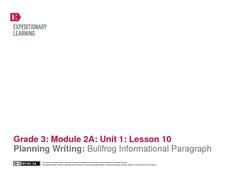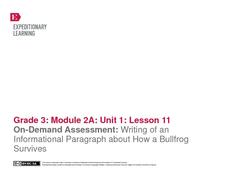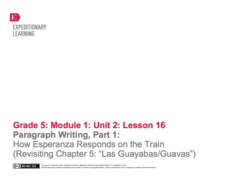EngageNY
Planning Writing: Bullfrog Information Paragraph
Lesson ten in this unit for the book Bullfrogs at Magnolia Circle, prepares third graders to begin writing an informational paragraph about the adaptations of bullfrogs. First, young writers work either independently or in pairs to...
EngageNY
On-Demand Assessment: Writing of an Information Paragraph About How a Bullfrog Survives
Having read and discussed Bullfrog at Magnolia Circle, third graders demonstrate their bullfrog expertise by writing informational paragraphs. Building on the note-taking and paragraph planning from the previous lesson plan, learners...
Teachers.net
How to Write a Movie Review from a Pet's Perspective
When would two paws up denote a blockbuster film in your classroom? Only when young writers create movie reviews from a pet's perspective in this imaginative expository writing practice. This engaging topic begins with a class discussion...
West Contra Costa Unified School District
Expository Writing in Math
Pupils engage in an activity where one partner reads directions while the other follows those directions to complete a math task (such as bisecting an angle). As a reflection, they examine products to see what information the best...
Overcoming Obstacles
Writing Reports
Following a review of how to research and take notes, scholars define the term paraphrase and identify ways to organize information and finish reports. To put their newfound knowledge to the test, learners interview a peer, take notes,...
Nancy Fetzer's Literacy Connections
Expository Paragraph
Upper elementary and middle school writers learn how to craft an expository paragraph by following the six steps detailed in a 48-page instructional guide. Learners learn how to write six different types of informational paragraphs: to...
EngageNY
Close Reading of Bullfrog at Magnolia Circle: Main Ideas about the Bullfrog
As your class reaches the end of the book Bullfrog at Magnolia Circle, the seventh lesson in this literary unit helps third graders transition from reading narrative to expository writing. Scholars develop their note-taking skills as...
Curated OER
Hula How?
Third graders start writing papers with much more regularity than they did in the previous grades. They are starting to differentiate between the styles of writing and know why each is important. This activity gives the them a chance to...
Curated OER
How to Write an Essay: Secondary ed.
Whether introducing the structure of expository essays or reviewing the format with your high schoolers, take the time to check out this resource. Examples of seven common forms of introductory paragraphs and six types of conclusions, as...
K20 LEARN
Let Us Start The Lettuce Club (Or Not): Writing A Thesis Statement
Let us be frank! Writers learn that crafting a thesis statement is not that difficult if one peals back the layers. After watching several videos about the elements of a thesis, class members read the article "Lettuce Club helps students...
Curated OER
Writing Classroom Agreements using Inspiration & Word to Go
How can you foster a thoughtful learning community for your class? First, the class brainstorms a list of behaviors that will help make the classroom a great place to learn. Then learners group similar ideas together and come up with...
Curated OER
Transition Words in Expository Writing
Create to learn! Your class can create posters of transitional words and phrases to help them compose an explanatory text. They work in groups and focus on one type of transition (time, place, importance, etc.). They also create a poster...
Bright Hub Education
Using Evidence and Supporting Details in Writing
In expository writing, it is important to back up claims with evidence and details. Help your class to develop their writing with notes on different types of evidence. Once they have the basics down, practice with a sample thesis and...
Curated OER
Working in your Cubicle: Critical Thinking and Writing
Explore informative and explanatory writing with this lesson. Using a cube labeled with directives to describe, analyze, compare, associate, apply, and argue the topic, middle schoolers work individually or in groups to answer questions....
Curated OER
A Proposal to Lessen World Hunger
Fifth graders conduct research. They explore how to give an oral presentation with visual aids. Students have the opportunity to create a proposal which could help alleviate world hunger. They brainstorm different ways children could...
Curated OER
Blogging to Create a Community of Writers #6: Writing a Review
Looking for a good social media lesson for your class? Then, this lesson is for you! They study various written reviews, then must choose an item to review of their choice. They can choose from: a book, restaurant, CD/musical...
Curated OER
Writing Prompts for High School
Here’s a great teacher resource - thirty-five writing prompts designed for high school writers. Categories include cause and effect, definition, expository/informative, persuasive, how to, descriptive, narrative, biographical narrative,...
Anti-Defamation League
Lonnie Chavis of 'This Is Us' Writes about Racism
Scholars read and discuss an essay by 12-year-old actor Lonnie Chaves about racism, paying close attention to how racism presents itself in interpersonal and institutional ways. Learners reflect on how they experience or witness racism...
Curated OER
Informative/ Expository Writing
Elementary schoolers are charged with writing an article for their peers. A class discussion yields topics about which learners consider themselves to be an expert. The teacher models how to construct an article by using facts he or she...
EngageNY
Paragraph Writing, Part 1: How Esperanza Responds on the Train (Revisiting Chapter 5: "Las Guayabas/Guavas")
When your class members have completed the novel Esperanza Rising, they will be ready to write an expository essay on how Esperanza responds to events and what this says about her character. Set your pupils up for success by starting out...
EngageNY
End of Unit Assessment: On-Demand Informational Paragraph About How the Poison Dart Frog Survives
A final assessment marks the end of a unit that takes a close look at a variety of informational texts all about frogs. A graphic organizer aides scholars in planning an accordion paragraph using their recorder forms from previous...
EngageNY
Paragraph Writing, Part II
Come up with a list of requirements for this expository essay on Esperanza's character in Esperanza Rising as a class and use the list to guide class writing. Here, learners will complete the first paragraph, discuss their notes for the...
EngageNY
Performance Task Preparation: Peer Critique and Mini-Lesson Addressing Common Errors: Revising Draft Essay to Inform
Time to revise! Using a writing evaluation rubric, scholars participate in a peer editing process to provide feedback on each others' informative essays. Next, pupils begin revising their drafts based on the feedback they receive.
Curated OER
Further Improvements of Writing Skills
Improve writing skills by finding a personal writing style, using descriptive language effectively, and using precise language. Middle schoolers discuss individual style in writing and formal and informal language. They utilize figures...

























